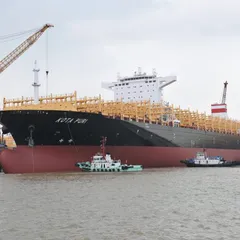SHIPPERS SAW A NEED FOR BIGGER VESSELS. THEY BUILT THEM TOO BIG
By Joe Weisenthal and Tracy Alloway
The "HMM Algeciras" entering the port of Hamburg Photographer: Axel Heimken/picture alliance/Getty Images
Supply Lines is a daily newsletter that tracks Covid-19’s impact on trade. Sign up here.
Unless you’re involved with international commerce in some way, you might not have heard that the cost of shipping goods out of China is absolutely soaring right now.
Here’s a few key comments, lightly edited, from the discussion:
I wouldn’t say necessarily that it’s bad for the overall global economy, but it’s really bad for the ship lines for sure. These mega ships have generally fouled up the transportation system. You actually have fewer ships calling at most ports today than you used to have. They’re much bigger. And so think of what this does to the operation of the port. You don’t have a smooth flow of cargo going through the port. Now you’ve got nothing happening in the port. It’s dead today. And then tomorrow, a ship shows up and it wants to unload 3,000 containers in your port. What do you do with this? How do you get it unloaded? Where do you put the containers? One thing that’s happened is that ships spend more time in port, which is very wasteful because it just takes more time to get so many containers on and off. The trucks are lined up at the gate because there’s so many containers to bring into, send out on these ships or so many containers to deliver. The railroads can’t handle this sudden flood of containers. So you have the cargo sitting around longer before it gets removed from the port. All of these things have tended to make transit times longer and have made it harder for shippers to get their freight where it’s supposed to be on deadline. And that’s bad for everybody.
Meanwhile, the industry is much more consolidated and tightly controlled by a few key players versus where it was over a decade ago, at the height of global trade:
The big players, have formed what are called alliances. So these alliances have kind of squeezed most of the smaller players out of the business. One alliance involves Maersk, the Danish company, and Mediterranean Shipping, which is based in Switzerland, and between them, those two companies have a little bit over a third of all of the container shipping in the world. There’s another alliance that has Cosco, the China ocean shipping company, the French company CMA CGM, and Evergreen -- a Taiwanese company. And it has about 30% of the world’s shipping. And then there’s another alliance that has the German company Hapag-Lloyd, and the Japanese lines and Korean line. And it has about 20%. So if you put those three alliances together, their market share in container shipping is close to 85%. Will those alliances stay together? At the moment, the system looks pretty stable. You can imagine that at some point, the government will step in and say, you guys can no longer have this alliance. It’s anticompetitive, but so far that hasn’t happened.
Even before things started to deteriorate globally and before the pandemic, the largest shipping-companies made what has turned out to be a strategic misstep -- switching to giant tankers, which haven’t proved to be as efficient as expected:
The slump in the growth of trade wasn’t really the only factor here. Ship lines, like companies in many other industries, have relentlessly pursued economies of scale, bigger was better. And it was true when you could build a ship that could carry 3,000 containers instead of 2,000 containers, the costs per container dropped a lot. And when you could build a ship that could carry 10, rather than five, the cost per container was much lower. So ship lines were aggressively pursuing economies of scale. What they didn’t count on was that at some point, the vessels would get so big that diseconomies of scale would set in. And that’s when you started to have this confusion in the ports. That’s when you start to have these delays in shipping, that’s when you start to have the entire industry become less reliable. And the diminished reliability is one of the things that is leading manufacturers and retailers to have a new sourcing pattern, to make their products in different places and to have redundant value chains. Size is never everything. And many of the ship lines mistakenly thought that it was.
bloomberg.com
Chinese shipyards win giant container ship order
03/01/2021 | 461 Views
Bocomm Leasing has commissioned the newbuildings at Yangzijiang Shipbuilding, Hudong-Zhonghua Shipbuilding and Jiangnan Shipyard. Each ship is priced at US$150 million, according to shipbrokers, meaning that all the newbuildings will cost US$900 million. The newbuildings will be delivered between 2023 and 2024.









main.comment_read_more